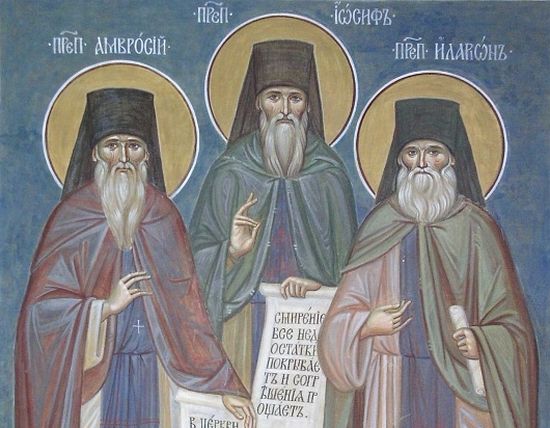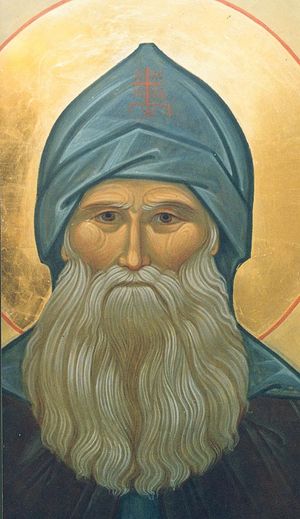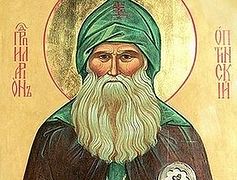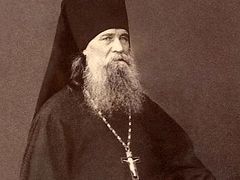 St. Hilarion of Optina. On October 1 we honor the memory of St. Hilarion of Optina. This remarkable ascetic had inimitable spiritual experience—as a disciple of the very first Optina elders Lev and Macarius and the preserver of the Optina traditions, with time he himself became an instructor and passed the baton of eldership on to the next generation of Optina elders.
St. Hilarion of Optina. On October 1 we honor the memory of St. Hilarion of Optina. This remarkable ascetic had inimitable spiritual experience—as a disciple of the very first Optina elders Lev and Macarius and the preserver of the Optina traditions, with time he himself became an instructor and passed the baton of eldership on to the next generation of Optina elders.
For people of our times, St. Hilarion’s instructions are particularly useful, because the elder was an great expert and experienced healer of emotional and spiritual illnesses—those things we now call depression, neurosis, obsessive compulsion, and various kinds of dependencies and phobias.
The elder considered that the main causes of these illnesses are remembrance of wrongs, resentment, unforgiving enmity, lack of honor for parents, and unrepented sins. The elder taught:
“Thus, the cause of our emotional and physical illnesses are our sins. Accordingly, there is only one cure: The suffering person should attentively take a look at himself, recall all his sins committed from age seven, and especially recognize the sin in which the cause of his illness consists.
Then he should sincerely confess these sins before the priest, make peace with his close ones, abandon all rancor against them and place a firm intention and beginning of not returning to his old sins, and finally, with a contrite heart go and receive the Holy Mysteries of Christ [Communion].”
If the sick ones would point to someone else as the cause of their illnesses, St. Hilarion would counsel them to ask forgiveness of that person if he’s alive; and if he’s not, then to have a Pannikhida served at his grave for the repose of his soul, give alms in his memory at the proskemedia, pray for him at home, and repent and carry out a penance.
We have testimony of the elder’s miraculous help in healing emotional and spiritual illnesses.
Enmity and non-submission to his father
“In the Novosilsky region there lived a merchant who was possessed of an illness that gave him not a minute of rest and brought him to the point of madness. He imagined that he was being followed from all sides, and that they wanted to tie him up and take his life. Unable to go on with his trade due to this, A. E. fled from people, his eyes wandering, pronouncing senseless words. His family was afraid that he might take his own life in a fit of madness.
“His wife was the most worried about his illness, and she finally thought of taking him to Optina Monastery. When they arrived at the monastery, she explained her husband’s illness to the elder and asked his help.
“The elder spent a long time with him and ascertained through questions that the main cause of his sickness was his enmity and disobedience to his father, which he had hidden in his heart. The elder persuaded A. E. for a long time to abandon his anger and ask forgiveness of his father, proving to him that only after this can he hope in God’s help and be delivered from his illness.
“The sick man was very stubborn at first; he justified himself and accused his father, but finally announced his readiness to do all that the elder had told him to do. St. Hilarion confessed him, and the after the sick man had been three days in the monastery following his partaking of Holy Communion, he went home to his father completely healthy.”
To ask forgiveness of his mother
“One merchant’s clerk from Nizhny, a middle-aged bachelor, suffered for several years from an illness that gave him no peace. In his words, he felt like someone was whispering thoughts to him of suicide. When he’d go to the water, the voice would whisper to him, “Why should you live any longer in the world? Drown yourself!” When he would see fire, the voice would suggest that he throw himself into it. When he would see a knife or a sharp object, the voice would urge him to stab himself, because there is no point in staying in this world.
“Wasted and thin, with hollow eyes from his illness, he came with his mother to the monastery, visited the elder, and when asked what he was suffering from, he explained that it was his conviction that he was sick because when he was two years old, his mother cursed him.
“The elder worked with him a long time, asking him in detail what he considered necessary; in conclusion he said that the cause was not what he was saying but something else, and that this illness was sent to him as punishment for his false views concerning his mother.
“His mother was a kind old lady who loved him very much, and wished him all the best, but he thought that she had made him unhappy all his life. For a long time he would not agree with the elder’s opinion. Finally at confession the elder, with God’s help, convinced him to abandon his false opinion that his mother had cursed him, and instead humble himself before her, asking her forgiveness with a feeling of repentance for his insulting opinion about her.
“Having fulfilled the elder’s instructions, he was vouchsafed Communion of the Holy Mysteries and appeared again to the elder in a renewed visage—peaceful and happy. He no longer heard those destructive suggestions; his conscience was at peace, and his soul, illumined with the Sacraments of confession and Communion, returned to a bright life. When he returned to Nizhny, he began to live his life according to the elder’s instructions.”
 Sts. Ambrose, Joseph, and Hilarion.
Sts. Ambrose, Joseph, and Hilarion.
“There is a touching story about the novice of Belev Convent, Maria, who left for Moscow and fell sick there with nervous fits. The elder foretold her return to the convent, which did occur in 1871. Fr. Hilarion lovingly received her at confession and when she again had a fit, he took care after it ended to confess the sick girl in great detail. After confession he consoled her like a child, gave her his prayer rope, a prosphora from a Liturgy he had served, some holy water and artos. He blessed her to drink the holy water at the onset of a fit.
“When seeing the sick one off, he blessed her and said, “Thank God, now you will live, and even if you should die, the Lord is merciful! May His holy will be done! Remember, that it is better to be the disciple of a disciple than to live relying on your own reasoning and your own will.” And turning to the sisters who accompanied her, he admonished them not to abandon the sick one.
“At their parting the elder was very consoled that the sick novice was able to bring forth sincere repentance, and he said, ‘Although the sisters think that she is not in such danger, but God knows that even the healthy sometimes die; but the sick one, especially in such a suffering state, is not out of danger. We don’t know what will happen to us the next night or tomorrow. Everything was done to help the poor girl. In such cases we should not put it off but make use of every minute in order not to leave a soul that seeks salvation without all possible help.”
“Returning to the guesthouse, the sick girl said to the sisters, ‘My friends! How light I am now in soul! My sinful heart has not felt for a long time such joyful peace of soul and such an inexplicable feeling as what I have carried away from Batiushka. Glory to God for all things!’
“She asked them to light the lampada, drank some holy water, took up the prayer rope she had received from the elder, and lay down on the bed after making the sign of the cross on herself. The sisters left the sick girl and went to dinner. After eating dinner and talking with each other about the consoling change that had come upon the Maria, then returned to her in order to read the prayers before sleep together—but they found Maria in eternal rest.
“When the elder learned of her repose he said, ‘This was to be expected, and that is why I didn’t want to leave her last evening without confession.’”
A notice from above
“One noblewoman suffered from a serious inner disorder. In Moscow her sickness was pronounced very dangerous, difficult or even impossible to cure because it had become advanced, and the lady returned from Moscow in serious condition. In early August of 1871 she went to Kiev to be treated by a famous doctor there.
“She expressed her caution to the elder concerning her incurable illness and the probability of it all ending badly. The elder did not deny these fears; to the contrary he was as if worried and shared them. However, when he then left the reception room for his cell and spent about fifteen minutes there, the elder again returned to the reception room and this time spoke positively that her illness would pass.
“Apparently the elder in his cell received a notice in prayer that her illness would successfully pass. And truly, after treatment by the Kiev doctor the lady completely recovered.”
Healing from the illness of unbelief
At the time, what we now consider the “right of the individual to have his own convictions”—unbelief in God, atheism—was then considered a mental illness. Here is an example of healing of the illness of unbelief:
“A student of the Moscow University, the Tula nobleman A.P.A., nearly reached a point of total unbelief in God. Passing by and stopping in the monastery, he had a positive conversation with the elder. The elder’s words, filled with sincere sympathy and kindness, had an effect on the young man.
“He agreed to admit his error, at the elder’s suggestion spent several days in the monastery, confessed, repented, and was vouchsafed to receive Holy Communion—which he had not done for several years. Then he left for Moscow a believing and pious Christian.”
Counsels of St. Hilarion
 St. Hilarion of Optina. In making admonishment, do not give food to your vanity, and consider whether you yourself would be able to do what you demand of others. Know when you can criticize and when it’s better to keep silence. If you feel that anger has possessed you, keep silence; do not say anything until your heart has calmed down, and then you can talk to your brother.
St. Hilarion of Optina. In making admonishment, do not give food to your vanity, and consider whether you yourself would be able to do what you demand of others. Know when you can criticize and when it’s better to keep silence. If you feel that anger has possessed you, keep silence; do not say anything until your heart has calmed down, and then you can talk to your brother.
If you need to bring your brother to reason but you see that he is shaken with anger or upset, do not say anything, so that you might not irritate him further. When you see that both you and he are calm, speak without criticizing, but with meekness.
***
I will answer your question that you rightly understand that if you make peace in your heart towards the one who is angry with you, then the Lord will put it into his heart to make peace with you.
***
We should strive to have a good opinion about people. Only God sees the heart; we cannot judge them unmistakably.
***
At your question as to whether your conscience can unmistakably show you your mistakes, I will answer you: We should not trust our own conscience very much, because it has not been purified as it should be.
***
Do you wish to fulfill the will and commandments of God, but in fact you see how far this fulfillment is from your desire? You ask, can I attain spiritual freedom, or is it this not given to everyone? It is given to those who ask for it: Ask, and it shall be given unto you (Matt. 7:7). As the Gospel widow thirsted for defense from her offender, so should we also ask.
Holy Father Hilarion, pray to God for us sinners!



